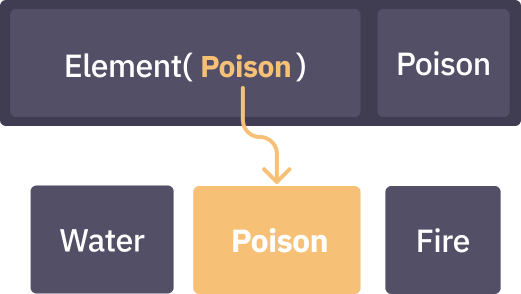Enums
Enum-like behavior can be achieved using slots. Slots are useful when defining mutually exclusive states, like when implementing character movement systems.
Slots are created using the slot function. They are defined with one or more value or tag components.
let MovementState = j.slot(Running, Walking, Crouching)
Slot components are added to entities like any other component. To create a slot component, call the slot (in this case MovementState) with one of its components.
world.create(MovementState(Walking))

Slots cannot be defined with relationships. For example,
ChildOf(*)is not a valid slot component.
A slot guarantees that at most one of the components included in its defintion may be attached to an entity.
let character = world.create(MovementState(Walking))
world.add(character, MovementState(Running))
// Error: A type may have at most one component for a given slot
You can find entities with a given slot by including the slot in a query’s terms.
world.query(MovementState).each(entity => {
// `entity` has a `MovementState`
})
Slots are implemented as relation components, so they follow the same semantics. This also means that a slot produces unique components that are independent of those it was defined with. Below is an example of a type that uses a slot to ensure the entity has at most one element (e.g. water, fire, poison), while also integrating another Poison component value for a separate use.
j.type(Element(Poison), Poison)
